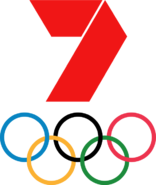Recent years
Seven held Australian free-to-air, pay television, online, and mobile telephony broadcast rights to the 2008 Summer Olympics in Beijing, on-selling some events to SBS. The live telecast of the Games of the XXIX Olympiad was shared by both the Seven Network and SBS Television. Seven broadcast the opening and closing ceremonies and mainstream sports, including swimming, athletics, rowing, cycling, and gymnastics. In contrast, SBS TV provided complementary coverage focused on long-form events such as football, road cycling, volleyball, and table tennis. [3]
Seven lost its Olympics rights for the 2010 Winter Olympics and the 2012 Summer Olympics to a joint bid by the Nine Network and Foxtel. [4] Rights to just the 2014 Winter Olympics were acquired by Network Ten. [5] [6] [7]
On 5 August 2014, it was announced that Seven had acquired rights to the Olympics in Australia across all platforms for an undisclosed amount, in a deal lasting from 2016 through 2020, and also including the 2014 Summer Youth Olympics. IOC president Thomas Bach praised the deal, stating that the Committee "enjoys long term partnerships and this agreement is something of a homecoming between us and Seven." Seven West Media CEO Tim Worner explained that unlike previous stints as rightsholder, it would not necessarily have to sub-license the Games to a secondary broadcaster (as it had historically done with the ABC), stating that "[with] around 150 hours of content on any given day, there will be many more opportunities than ever before". However, Worner did not rule out the possibility of doing so. [8]
For the 2016 Summer Olympics, coverage was offered across Seven, 7Two and 7mate. In order to allow Games to be broadcast in high definition in all capital cities, 7HD was temporarily changed to a simulcast of Seven's primary channel in Sydney, Brisbane and Perth for the duration of the Games. The Games were also streamed through a freemium mobile app; full access to Games content (including coverage of all events on live and on-demand basis) required purchase of a "premium" service costing $19.99. This content was also available free to Telstra mobile subscribers. Free content was limited to 900 hours of live content simulcast from the three Seven Network channels, and 300 hours of live digital-only content. [9] [10] [11] [12] Highlights of events were broadcast in the afternoon, while primetime program In Rio Today broadcast key moments, interviews and background information each night. Regularly scheduled programs Sunrise , Seven News at 6pm and The Chase Australia aired throughout, while other programming were taken off air for the duration of the Games on Seven. [13]
Seven offered 2018 Winter Olympics coverage across Seven, 7Two and 7mate as well as its "OlympicsOn7" app, which similarly to its 2016 Olympics service, offered a mix of free or paid coverage. 245 hours of broadcast Olympic content are expected. Seven will continue broadcasting scheduled programs Sunrise, The Chase Australia, Seven News at 6pm, Home & Away and My Kitchen Rules , with Olympic coverage airing at other times on its main channel. Hamish McLachlan, Edwina Bartholomew, Mel McLaughlin and Jason Richardson will be primary anchors based in PyeongChang. Three Olympic-themed The Front Bar specials will air during coverage. [14]
Seven lost the rights to the 2024 Summer Olympics, the 2026 Winter Olympics, the 2028 Summer Olympics, the 2030 Winter Olympics and the 2032 Summer Olympics to rivals Nine Network. [15] [16]
